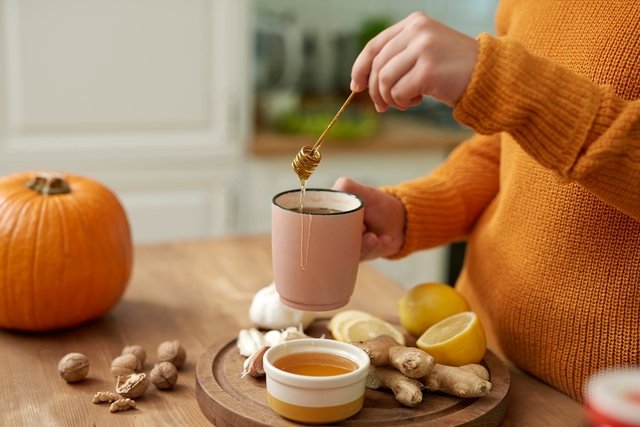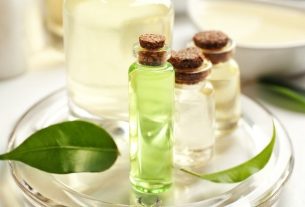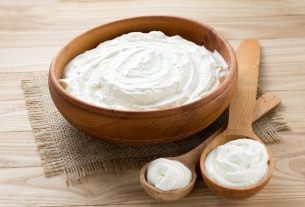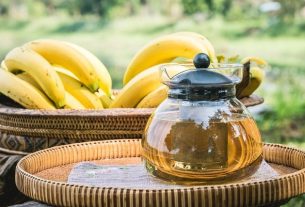Lemon garlic tea is a great home remedy that helps prevent premature aging, maintain heart health and strengthen the immune system.
In addition, lemon and garlic tea also helps to relieve some cold and flu symptoms, such as headache, runny nose, malaise, cough and stuffy nose.
These benefits are possible because this tea contains good amounts of flavonoids, vitamin C, allicin and ajoene, which are nutrients and bioactive compounds with antimicrobial, anti-inflammatory and antioxidant action.

What is it for
The main health indications of lemon tea with garlic are:
- Strengthen the immune system, because it contains vitamin C, a nutrient with anti-inflammatory action that improves the functions of the body’s defense cells;
- Prevent premature aging, as it contains flavonoids and limonene, bioactive compounds that protect healthy skin cells against damage caused by free radicals;
- Relieve cold and flu symptoms, such as runny nose, headache, cough and stuffy nose, as it has antimicrobial and anti-inflammatory action;
- Maintain heart health, as it contains allicin and ajoene, essential oils with antioxidant and anti-inflammatory action that help balance blood cholesterol and blood pressure.
Furthermore, this tea also has diuretic properties, reducing fluid retention and thus helping with weight loss. See other diuretic teas that help with weight loss.
How to make
This tea can be prepared using just garlic, lemon and water.
Ingredients:
- 1 clove of garlic;
- Juice of ½ lemon;
- 1 cup (tea) of water.
Preparation mode:
Crush the garlic clove and set aside. Place the water in a pan and bring to a boil. After turning off the heat, add the crushed garlic and cover the pan, letting it rest for 5 minutes. Finally, strain the drink, add lemon juice, mix well and drink immediately.
Lemon Garlic Tea Recipes
Other tasty lemon and garlic tea recipes that can be prepared are:
1. Lemon tea with garlic and ginger
Garlic tea with lemon and ginger helps relieve nasal congestion and sore throat, as well as improving digestion and relieving nausea. Check out other benefits of ginger.
Ingredients:
- 3 teaspoons of grated fresh ginger root;
- 500 ml of water;
- 2 tablespoons of lemon juice.
Preparation mode:
Place the ginger and water in a pan and bring to a boil for about 10 minutes. Then remove the pan from the heat, strain the drink and add the lemon juice and honey, mixing well. You can drink up to 3 cups of this tea per day.
2. Lemon tea with garlic and honey
This tea contains limonene, the main essential oil present in lemon peel that has a digestive and antimicrobial effect, improving digestion and strengthening the immune system.
Ingredients:
- 1 cup (tea) of water;
- 1 teaspoon of honey;
- 3 cm of lemon peel, cut very thinly.
Preparation mode:
Boil the water and, after removing the pan from the heat, add the lemon peel and cover the pan, letting it rest for 5 minutes. Strain the drink, add honey, mix well and then drink.
Possible side effects
Using lemon and garlic tea can cause garlic odor, stomach pain, heartburn and nausea in some people.
Because it contains garlic, excessive consumption of this tea can cause cramps, gas, vomiting, diarrhea, headache and dizziness.
Who shouldn’t use
Lemon tea with garlic is contraindicated during dengue fever, because garlic makes clotting difficult, favoring bleeding and hemorrhages.
The consumption of this tea is contraindicated for pregnant or breastfeeding women. Likewise, this tea is not recommended for children under 2 years of age or people with problems such as gastritis, ulcers, reflux, esophagitis, low blood pressure and bleeding.
People who use coagulation or antihypertensive medications should only consume this tea under the recommendation of a doctor.
Furthermore, the use of lemon and garlic tea should be stopped 7 days before and after surgery, as it may increase the risk of bleeding.
Bibliography
- AL-QUDAH Tamara; ZAHRA Umber et al. Lemon as a source of functional and medicinal ingredient: A review. International Journal of Chemical and Biochemical Sciences. 14. 55-61, 2018
- OREGON STATE UNIVERSITY. Garlic and Organosulfur Compounds. Available at: <https://lpi.oregonstate.edu/mic/food-beverages/garlic>. Accessed on March 29, 2023

Sign up for our newsletter and stay up to date with exclusive news
that can transform your routine!
Warning: Undefined array key "title" in /home/storelat/public_html/wp-content/plugins/link-whisper-premium/templates/frontend/related-posts.php on line 12
Warning: Undefined array key "title_tag" in /home/storelat/public_html/wp-content/plugins/link-whisper-premium/templates/frontend/related-posts.php on line 13



